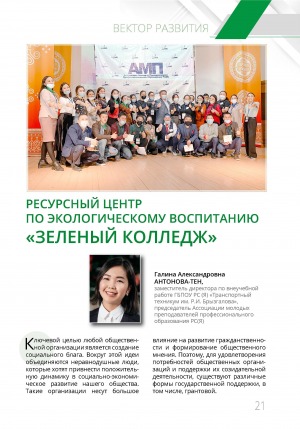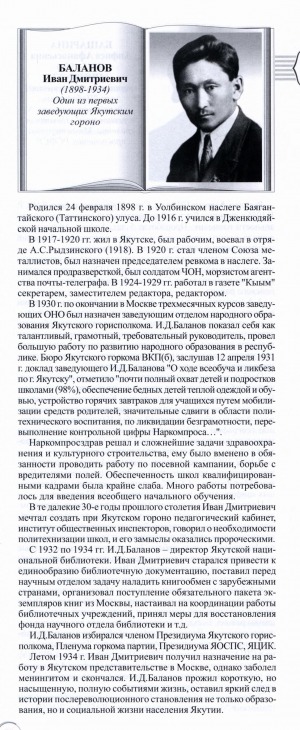- Книга (5992)
- Газета (53)
- Журнал (314)
- Автореферат диссертации (576)
- Изоиздание (51)
- Аудиоиздание (42)
- Видеоиздание (270)
- Картографическое издание (5)
- Неопубликованный документ (610)
- Нотное издание (17)
- Фотография (26)
- Статья (3677)
- Библиографический указатель (90)
- Словарь (12)
- Календарь (7)
- Брошюра (144)
- Буклет (38)
- Электронное издание (2)
- 3D-модель (21)
- Грампластинка (13)
- Веб-архив (2720)
- Бурятский (3)
- Чукотский (9)
- Долганский (2)
- Английский (242)
- Эскимоский (3)
- Эвенкийский (11)
- Эвенский (86)
- Французский (17)
- Немецкий (7)
- Хантыйский (1)
- Киргизский (1)
- Корейский (1)
- Мансийский (1)
- Нанайский (1)
- Ненецкий (4)
- Нганасанский (1)
- Нивхский (1)
- Старорусский (16)
- Польский (6)
- Русский (12547)
- Латинская графика (114)
- Испанский (2)
- Таджикский (1)
- Тунгусский (5)
- Турецкий (5)
- Ульчский (1)
- Узбекский (1)
- Якутский (1572)
- Юкагирский (16)
- Не указан (4)
- Литературно-художественные издания (671)
- Официальные издания (1316)
- Научные издания (5093)
- Научно-популярные издания (2211)
- Информационные издания (3508)
- Справочные издания (66)
- Учебные издания (1037)
- Производственно-практические издания (36)
- Массово-политические издания (683)
- Изобразительное издание (55)
Источник: Якутия. - 2010. - 16 октября. - С. 2.
Количество страниц: 1 с.
Количество страниц: 1 с.
Количество страниц: 2 с.
Количество страниц: 4 с.
- Общественные науки. Образование > Народное образование. Воспитание. Обучение. Организация досуга > Профессиональное и среднее специальное образование,
- НАУКА ЯКУТИИ > ОБЩЕСТВЕННЫЕ НАУКИ > Народное образование. Воспитание. Обучение. Организация досуга > Профессиональное и среднее специальное образование.
Иванов, Николай Николаевич.
Транспортный техникум подводит итоги года = Transport college sums up the results of the year / Николай Николаевич Иванов // Профессиональное образование Якутии. - 2022. - N 4.- С. 10-13.
Количество страниц: 3 с.
- Общественные науки. Образование > Народное образование. Воспитание. Обучение. Организация досуга > Профессиональное и среднее специальное образование,
- НАУКА ЯКУТИИ > ОБЩЕСТВЕННЫЕ НАУКИ > Народное образование. Воспитание. Обучение. Организация досуга > Профессиональное и среднее специальное образование.
Иванов, Николай Николаевич.
Транспортный техникум открывает новые мастерские: модернизация процессов обучения и внедрение инновационных методов = Transport college opens new workshops: modernization of learning processes and introduction of innovative methods / Николай Николаевич Иванов // Профессиональное образование Якутии. - 2022. - N 2.- С. 4-6.
Количество страниц: 4 с.
- Общественные науки. Образование > Народное образование. Воспитание. Обучение. Организация досуга > Профессиональное и среднее специальное образование,
- НАУКА ЯКУТИИ > ОБЩЕСТВЕННЫЕ НАУКИ > Народное образование. Воспитание. Обучение. Организация досуга > Профессиональное и среднее специальное образование.
The professional and educational duster in the transport direction was created in December 2017 and covers four types of transport: automobile, railway, river, aviation. It was created to streamline and coordinate the activities of training and advanced training of personnel, search for optimal ways to manage the system.
Иванов, Николай Николаевич.
Транспортный профессионально-образовательный кластер = Transport professional and educational cluster / Николай Николаевич Иванов ; Транспортный техникум им. Р. М. Брызгалова. - (Профессионально-образовательные кластеры Якутии) // Профессиональное образование Якутии. - 2021. - N 3 (39), октябрь. - С. 61-64.
Количество страниц: 5 с.
- Общественные науки. Образование > Народное образование. Воспитание. Обучение. Организация досуга > Профессиональное и среднее специальное образование,
- НАУКА ЯКУТИИ > ОБЩЕСТВЕННЫЕ НАУКИ > Народное образование. Воспитание. Обучение. Организация досуга > Профессиональное и среднее специальное образование.
This article is devoted to the generalization of the theoretical and practical experience in the use of pedagogical technologies in the educational process of “Transport technical college named after R.I. Bryzgalov”
Беляева, Оксана Егоровна.
Использование современных технологий в образовательном процессе = The use of modern technologies in the educational process / Оксана Егоровна Беляева ; Транспортный техникум им. Р. И. Брызгалова // Профессиональное образование Якутии. - 2022. - N 2.- С. 35-39. Рез. также англ. - Библиогр.: с. 39 (3 назв.). - Данная статья посвящена обобщению теоретического и практического опыта в использовании педагогических технологий в образовательном процессе ГБПОУ РС (Я) "Транспортный техникум им. Р.И. Брызгалова". Представлены результаты социологического исследования, позволяющие оценить опыт использования современных технологий. - This article is devoted to the generalization of the theoretical and practical experience in the use of pedagogical technologies in the educational process of “Transport technical college named after R.I. Bryzgalov”.
Количество страниц: 4 с.
- Общественные науки. Образование > Народное образование. Воспитание. Обучение. Организация досуга > Профессиональное и среднее специальное образование,
- НАУКА ЯКУТИИ > ОБЩЕСТВЕННЫЕ НАУКИ > Народное образование. Воспитание. Обучение. Организация досуга > Профессиональное и среднее специальное образование.
Антонова-Тен, Галина Александровна.
Ресурсный центр по экологическому воспитанию "Зеленый колледж" : [о проекте Ассоциации молодых преподавателей профессионального образования Республики Саха (Якутия)] / Галина Александровна Антонова-Тен // Профессиональное образование Якутии. - 2021. - N 3 (39), октябрь. - С. 26-29.
Количество страниц: 4 с.
- Общественные науки. Образование > Народное образование. Воспитание. Обучение. Организация досуга > Профессиональное и среднее специальное образование,
- НАУКА ЯКУТИИ > ОБЩЕСТВЕННЫЕ НАУКИ > Народное образование. Воспитание. Обучение. Организация досуга > Профессиональное и среднее специальное образование.
The article discusses the experience of working on the development of educational programs of secondary vocational education according to new layouts
Алексеева, Любовь Максимовна.
Вопросы разработки образовательных программ среднего профессионального образования по новым макетам = Issues of developing educational programs of secondary vocational education according to new layouts / Любовь Максимовна Алексеева ; Транспортный техникум им. Р. И. Брызгалова // Профессиональное образование Якутии. - 2022. - N 2.- С. 26-29.









